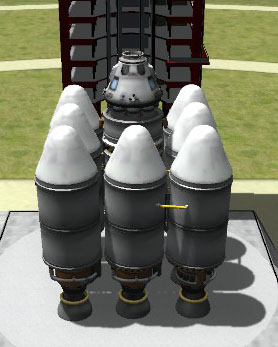Difference between revisions of "Talk:Asparagus staging"
(→From a total n00b view, no how-to?: new section) |
(→From a total n00b view, no how-to?) |
||
| Line 26: | Line 26: | ||
== From a total n00b view, no how-to? == | == From a total n00b view, no how-to? == | ||
| − | As not-a-tutorial this article explains the purpose of asparagus staging well, but not how to implement it. It isn't intuitive, at least not looking at the Kerbal X staging diagram, because there are four 'micro-stages' in there and, aside from the grouping of engines into four groups, there's no visible way to tell that this is | + | As not-a-tutorial this article explains the purpose of asparagus staging well, but not how to implement it. It isn't intuitive, at least not looking at the Kerbal X staging diagram, because there are four 'micro-stages' in there and, aside from the grouping of engines into four groups, there's no visible way to tell that this is intentional design. Is this intended as a not-a-tutorial page? Or would a short, 'how to group engines for asparagus staging' section be OK here? |
[[User:Gordonf|Gordonf]] ([[User talk:Gordonf|talk]]) 15:13, 28 January 2016 (UTC) | [[User:Gordonf|Gordonf]] ([[User talk:Gordonf|talk]]) 15:13, 28 January 2016 (UTC) | ||
Revision as of 15:15, 28 January 2016
Contents
Falcon Heavy analogue
Hi, when I'm reading this correct, the Falcon Heavy simply uses “parallel staging” for the first stage, as all engines are started in the first stage and after the booster run out of fuel they are jettisoned. Now “asparagus staging” with only one booster pair is identical to the “parallel staging”. — XZise (talk) 12:16, 1 March 2013 (CST)
- "Asparagus staging" uses cross-feed of fuel so all the remaining fuel tanks are full after staging events. This is the case on Falcon Heavy, where fuel from the side boosters is fed into the center tank of the first stage. MattW (talk) 13:59, 8 March 2013 (CST)
Naming
I have 2 suggestions: For a very serious sounding title, I recommend "Radial Staging" or "Radial Crossfeed Staging". However, Whenever I have a rocket design that is 8 outer rockets mounted to a central rocket, I prefer the term "Rocktopus". Ninenineninefour (talk) 12:20, 2 March 2013 (CST)
- Radial staging would be a misnomer, because the stages don't necessarily have to be radial. You can also use this technique when you place the stages next to each other in a line. I have a different suggestion, though. When you feed one stage from all others, it's called parallel crossfeed staging. When you do asparagus staging, you have a series of stages which take over the fuel supply. So why not call Asparagus Staging Serial Crossfeed Staging? I do, however, doubt that any new name will catch on so quick. The term is too established in the KSP community already. --Crush (talk) 07:03, 3 March 2013 (CST)
I suggest the name "Onion Staging", it seems more fitting because it is composed of layers of stages. Also the layers peel off as they go up just as an onion is peeled. --rsgm (talk) 18:37, 2 April 2013 (CST)
- "Onion staging" commonly refers to the staging where tanks drop in layers, outer-to-inner, with the entire layer dropping at once, as distinguished from "asparagus staging" where you just drop two "stalks" at a time rather than the entire layer. --Gaius (talk) 03:22, 28 February 2014 (CST)
Is this a tutorial?
Hi, is this a tutorial? For me it looks more like a standard article. If nobody object I'll can move it to 'Asparagus staging. — xZise [talk] 05:26, 13 August 2013 (CDT)
From a total n00b view, no how-to?
As not-a-tutorial this article explains the purpose of asparagus staging well, but not how to implement it. It isn't intuitive, at least not looking at the Kerbal X staging diagram, because there are four 'micro-stages' in there and, aside from the grouping of engines into four groups, there's no visible way to tell that this is intentional design. Is this intended as a not-a-tutorial page? Or would a short, 'how to group engines for asparagus staging' section be OK here? Gordonf (talk) 15:13, 28 January 2016 (UTC)
